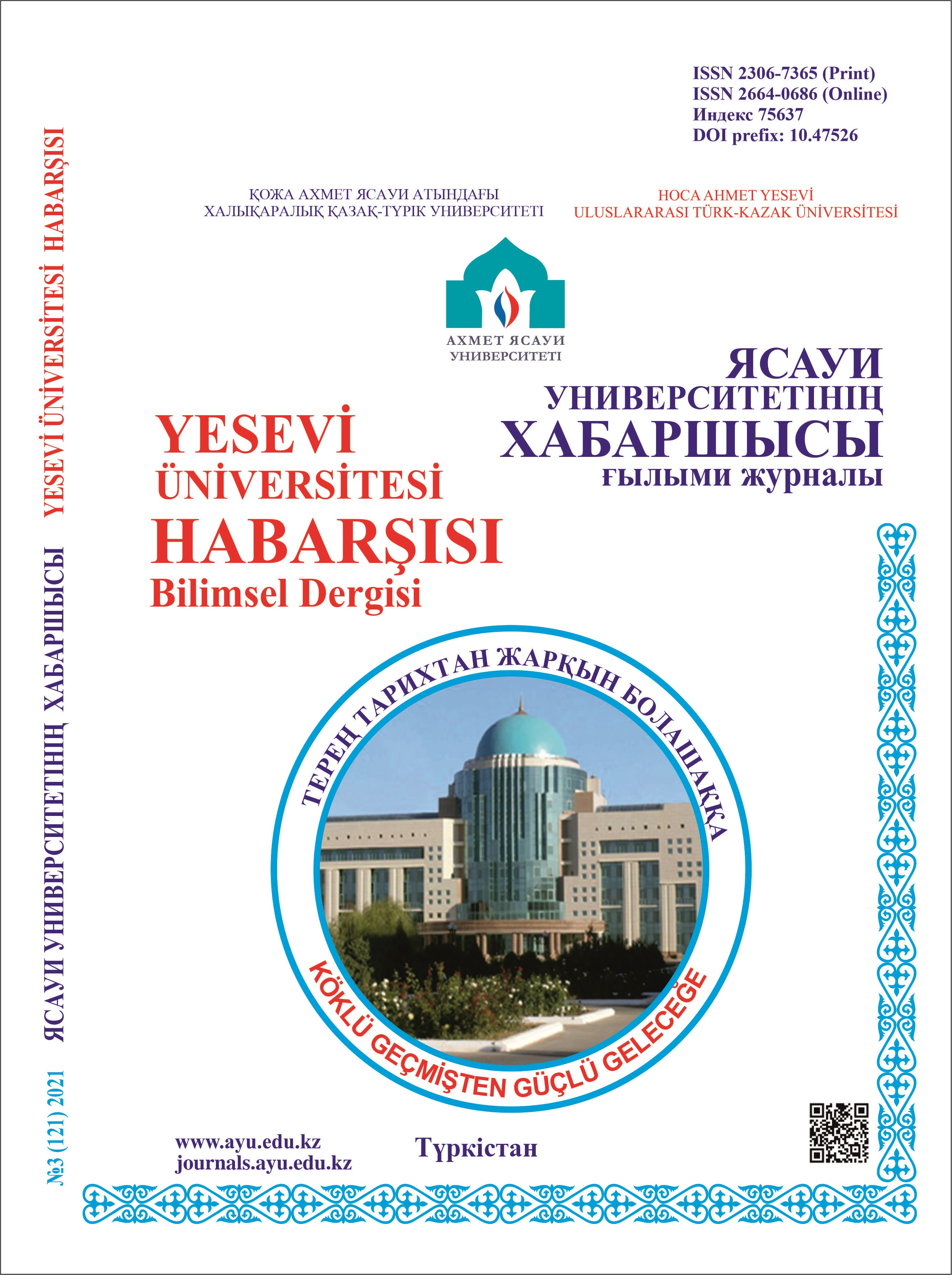Yabancı Dil Eğitimcilerinin Milli Kimlik Üzerinden Dilsel ve Kültürel Yeterliliklerinin Oluşturulması
197 194
Anahtar Kelimeler:
pre-service teachers, national identity, foreign language education, linguistic and cultural competence, national identity perception.Özet
Training future teachers of Foreign Language Education requires a methodological
study of national identity in teaching English. National identity encompasses all aspects of cultural
and traditional values. Based on qualitative research methodology, participants consisted of 120
pre-service foreign language teachers. Survey developed based on qualitative means, which
included open-ended questions regarding the pre-service foreign language teacher's perceptions.
The main features of the formation of linguistic and cultural competence of future English teachers
are considered. Study aims to identify and form linguistic and cultural competence within the
national identity of university students studying in Kazakhstan. The methodology aimed at
identifying the ideas of students of universities in Kazakhstan about national identity is a descriptive study within the framework of the survey model. Data is collected using the national identity perception scale. A model for forming a national identity when teaching a foreign language is proposed. The study results, it can be concluded that students’ express opinions on the first stage, national identity and values on the second stage, which is the attitude to national identity and religion as part of national identity.
Referanslar
Archanjo R., Barahona M., Finardi K.R. Identity of foreign language pre-service teachers to speakers of
other languages: Insights from Brazil and Chile // Colombian Applied Linguistics Journal. – 2019. – Т.
– №1. – P. 71–84.
Railianova V. Methods of foreign language remote teaching. In: Modern approaches to foreign
language remote teaching: collective monograph. – Lviv: Liha-Pres, 2020. – P. 67–87.
https://doi.org/10.36059/978-966-397-226-8-4
Sercu L. The foreign language and intercultural competence teacher: the acquisition of a new
professional identity // Intercultural education. – 2006. – Т. 17. – №1. – P. 55–72.
Byram M. ‘Cultural awareness’ as vocabulary learning // Language learning journal. – 1997. – Т. 16. –
№1. – P. 51–57.
Bakum Z. et al. Formation of Cross-cultural Competence of Prospective English Teachers // Arab
World English Journal (AWEJ). – 2022. – Vol. 13. – №4. – P. 523–538.
https://dx.doi.org/10.24093/awej/vol13no4.34 6. Karhunen P., Kankaanranta A., Räisänen T. Towards a Richer understanding of language and identity in
the MNC: Constructing cosmopolitan identities through “English” // Management International Review.
– 2023. – Т. 63. – №3. – P. 507–530.
Sampson G. Language Teachers’ Cultural Identity and its Impact on their Practice // International
Journal of Social Science And Human Research. – 2023. – Vol. 06. – Issue 03. – P. 1611–1613. DOI:
47191/ijsshr/v6-i3-34
Kissau S. Davin K.J., Haudeck H., Wang C. Different approaches, similar results: Preparing foreign
language teachers to implement high‐leverage teaching practices // Foreign Language Annals. – 2023. –
Т. 56. – №4. – P. 950–971.
Kim D. Learning language, learning culture: Teaching language to the whole student // ECNU Review
of Education. – 2020. – Т. 3. – №3. – P. 519–541.
Garrett-Rucks P. Advancing Intercultural Learning in World Language Education: Recent
Developments in Pre-Service Teacher Education in the US // Intercultural Communication Education. –
– Т. 1. – №3. – P. 110–122.
Denissova G.V., Redkina E.A., Zalizniak A.A. Developing secondary language identity in the context
of professional communication // Psychology in Russia: State of the art. – 2019. – Т. 12. – №1. – P. 20–
Garaeva A. The development of linguocultural competence of students in teaching the history of the
English language // Procedia-Social and Behavioral Sciences. – 2014. – Т. 152. – P. 1012–1018.
Meihami H., Rashidi N. Cultural identity development in second language teacher education: Toward a
negotiated model // The Qualitative Report. – 2020. – Т. 25. – №8. – P. 3101–3127.

